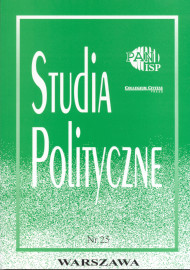Polska kultura i nauka w 1968 roku. Uwarunkowania i podstawowe problemy egzystencji
Polish culture and science in 1968. The determinants and basic problem of existence
Author(s): Eugeniusz Cezary Król Subject(s): Cultural history
Published by: Instytut Studiów Politycznych PAN
Summary/Abstract: The author presents the determinants and basic problems of existence of Polish science and culture in the period preceding the turbulent year of 1968, as well as the events directly related to this key date in Poland’s history. The departure, by Mr Gomułka’s team, from the ‘achievements’ of the Polish October of ’56, that is, from certain concessions of a democratic nature, evoked deep disappointment in both institutions and the scientific, cultural and artistic milieus, and this, in time, led to attempts at protest. The tightening of censorship, restrictions in the allocation of printing paper for books and periodicals, the closing down of newspapers, weeklies and magazines ‘inconvenient’ from the point of view of the authorities, the lack of opportunities for dialogue and constructive criticism, repressions against those who openly expressed their independent opinions, and the systematic surveillance of the scientific and creative milieus, were only a part of operations undertaken by the PRP powers-that-be in the second half of the 1960s. It was the shortcomings of the centralised, command economy and the growing shortages in the shops which resulted in Poland’s situation becoming unstable and threatening to explode. The role of the fuse was performed by the events of March 1968, which were enacted in the cultural and scientific milieus: the turbulent meetings of Warsaw’s men and women of letters, the removal of Adam Mickiewicz’s Dziady (Forefathers’ Eve) from the National Theatre’s repertoire, the manifestation in protest against the removal which followed the last performance, and finally, the students’ rally in the courtyard of Warsaw University, as well as the strikes on the part of students and the personnel of higher education institutions in Warsaw and other Polish cities as the continuation of that rally. It was after these events, when the party had launched an anti-intelligentsia campaign, supplemented with an anti-Semite witch hunt and smear campaign, unleashed by the ‘partisans’ faction around Mieczysław Moczar and by Mr Władysław Gomułka himself. An ‘ethnic criterion’ was applied to the Polish scientific and cultural milieus, eliminating, in the climate of a media witch hunt, renowned academic teachers, scholars, film-makers, publishers, journalists, men and women of letters of Jewish extraction and, finally, driving them to emigrate from Poland. It was in this period that Polish culture and science toughened up and delivered itself of illusions; however, it also suffered losses, the recouping of which would be a painful process and, subsequently, would subsequently take its full toll of years.
Journal: Rocznik Polsko-Niemiecki / Deutsch-Polnisches Jahrbuch
- Issue Year: 2010
- Issue No: 18
- Page Range: 77-107
- Page Count: 31
- Language: Polish

